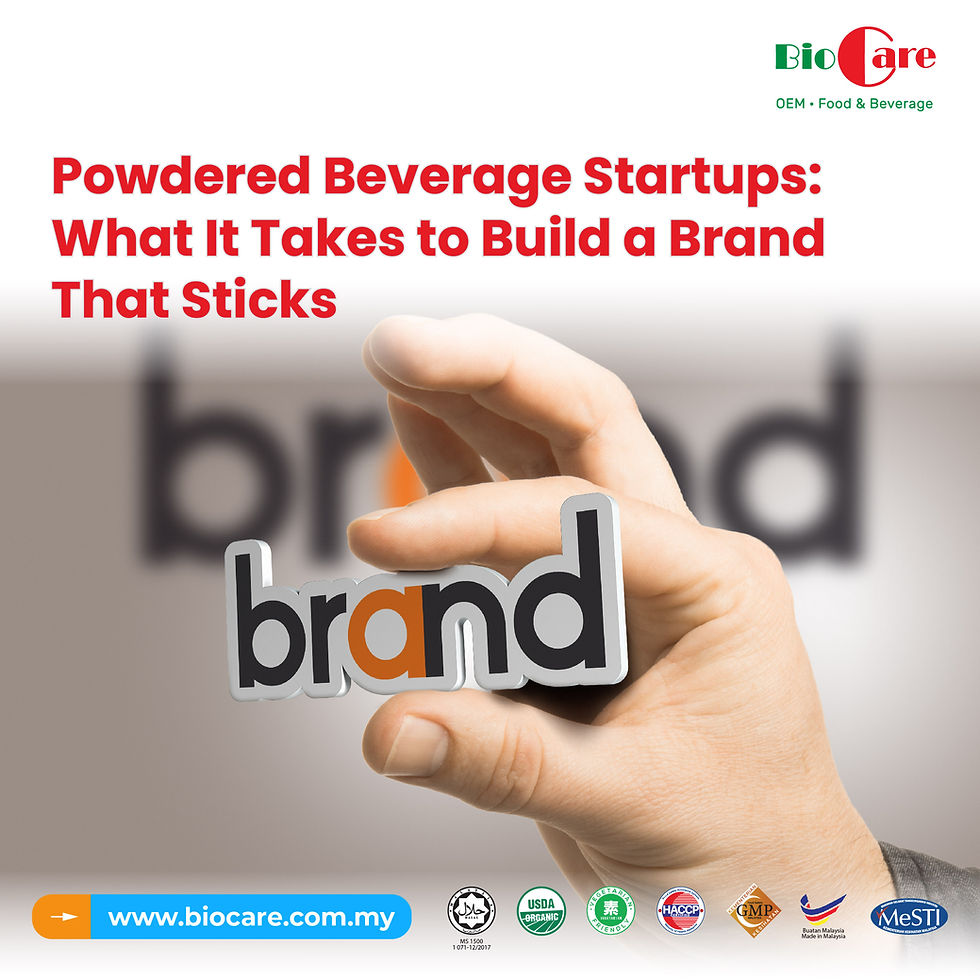Powdered Beverage Startups: What It Takes to Build a Brand That Sticks
- biocare

- Aug 25, 2025
- 4 min read
Updated: Nov 27, 2025

In today’s competitive beverage industry, powdered drinks are making waves. From instant coffees and multigrain blends to functional wellness powders, the demand for convenience-driven, health-conscious products is surging. For startups, this sector presents a massive opportunity—but also a complex battlefield. To truly build a brand that sticks, entrepreneurs must understand not just product development, but also branding, compliance, and go-to-market execution.
Below, we share a comprehensive roadmap for powdered beverage startups looking to thrive and dominate their niche.
Understanding the Powdered Beverage Market Landscape
The powdered beverage industry is projected to grow exponentially over the next decade, fueled by:
Health and wellness trends: Consumers are shifting to functional beverages with benefits like energy, weight management, gut health, and stress relief.
Convenience: Busy lifestyles demand easy-to-mix drinks that fit on-the-go consumption.
Sustainability: Powdered drinks reduce packaging, shipping weight, and carbon footprints.
Startups must first conduct in-depth market research, evaluating consumer pain points, purchasing behaviors, and competitor positioning. This research forms the foundation for creating a product that is both relevant and resilient.
Step 1: Defining Your Unique Value Proposition
A crowded marketplace requires more than just a good idea. Startups must answer:
What makes your beverage stand out?
Which problem does it solve better than competitors?
How does it align with long-term consumer trends?
For instance, a startup might focus on powdered beverages for athletes with enhanced electrolytes, or plant-based, dairy-free powdered milk alternatives for eco-conscious consumers. A clear brand story and positioning not only attract customers but also build loyalty.
Step 2: Product Development and R&D
The core of a powdered beverage brand is product quality. Startups should prioritize:
Ingredient sourcing: Premium, traceable, and clean-label ingredients are non-negotiable.
Formulation expertise: Work with food scientists and nutritionists to ensure taste, solubility, and health benefits.
Stability testing: Products must remain consistent in flavor and texture over time.
Startups can also leverage OEM (Original Equipment Manufacturer) partnerships, which provide turnkey solutions from R&D to production, ensuring cost efficiency without sacrificing quality.
Step 3: Regulatory Compliance and Certifications
Nothing destroys a beverage brand faster than regulatory missteps. Startups must comply with food safety and labeling regulations, which differ across regions. Key certifications to consider include:
GMP (Good Manufacturing Practices)
Halal certifications
Organic and Non-GMO labels
FDA or local authority approvals
Certifications not only safeguard compliance but also enhance consumer trust. They are often a deciding factor for B2B buyers and retailers.
Step 4: Branding That Resonates
In the beverage sector, branding is everything. A successful powdered beverage startup must invest in:
Logo and packaging design: Visually striking yet functional packaging that communicates value.
Emotional storytelling: A narrative that resonates with target customers, such as sustainability, tradition, or innovation.
Digital presence: A strong website, optimized for SEO, is a non-negotiable asset for discovery.
Brands that create a lifestyle rather than just a product often outperform their competitors.
Step 5: Go-To-Market Strategy
Brilliant products often fail due to poor go-to-market execution. Startups should structure a multi-channel sales strategy that includes:
Direct-to-Consumer (DTC): Selling online through e-commerce platforms with tailored digital marketing.
Retail partnerships: Collaborating with supermarkets, health stores, and specialty shops.
B2B sales: Supplying cafes, hotels, gyms, and corporates looking for unique beverage solutions.
Digital marketing—particularly social media, influencer collaborations, and content marketing—is critical to gaining visibility in a saturated space.
Step 6: Scaling Production and Distribution
As demand grows, startups must prepare to scale sustainably. This involves:
Partnering with reliable contract manufacturers capable of large-scale production.
Building strong supply chain logistics to manage inventory and prevent stockouts.
Exploring global distribution opportunities, especially in fast-growing markets across Asia, the Middle East, and North America.
Efficient scaling ensures that startups can meet demand spikes without compromising quality.
Step 7: Leveraging Trends and Innovation
To remain relevant, powdered beverage startups must embrace constant innovation. Current trends include:
Functional beverages with adaptogens, probiotics, and nootropics.
Plant-based formulations catering to vegans and flexitarians.
Sugar-free or low-calorie options to meet wellness-focused consumer demands.
Personalized nutrition, allowing customers to customize blends based on their needs.
Startups that quickly adapt to these trends can secure first-mover advantages.
Step 8: Building Long-Term Customer Relationships
Retention is more cost-effective than acquisition. Startups should invest in community-building and customer loyalty programs:
Subscription models for repeat purchases.
Reward programs that incentivize referrals.
Social media engagement, creating a sense of belonging among customers.
A brand that cultivates an emotional connection will enjoy repeat sales and organic advocacy.
Step 9: Measuring Success and Adapting
Data-driven decision-making is the hallmark of successful startups. Key metrics include:
Customer acquisition cost (CAC)
Lifetime value (LTV)
Return on advertising spend (ROAS)
Repeat purchase rate
By tracking these, startups can continuously refine strategies, optimize budgets, and scale profitably.
Launching a powdered beverage startup is an ambitious venture—but with the right strategy, it’s also a lucrative one. Success depends on a strong product, compliance, branding, and adaptability to evolving market trends. Startups that align innovation with consumer needs will not just survive but thrive.



